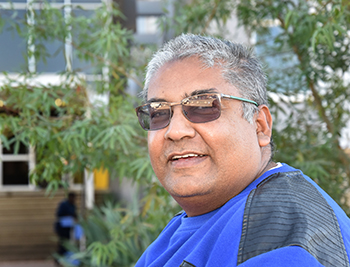Latest News Archive
Please select Category, Year, and then Month to display items
25 September 2024
|
Story Jacky Tshokwe
|
Photo Supplied
 Prof Louise Cilliers, University of the Free State (UFS) research fellow and former head of the Department of Classical Studies.
Prof Louise Cilliers, University of the Free State (UFS) research fellow and former head of the Department of Classical Studies.
Prof Louise Cilliers, one of our esteemed research fellows and former head of the Department of Classical Studies, has been awarded the prestigious 2024 UJ Translation Prize. Prof Cilliers received this accolade for her exceptional Afrikaans translation of the renowned Greek poet Konstantinos Kavafis' poetry collection, Van Alexandrië na Ithaka, published by Naledi.
Konstantinos Kavafis (1863-1933) is considered one of the most important literary figures in modern Greek poetry, known for his reflective and often philosophical poems that explore themes of history, identity, and human experience. In Van Alexandrië na Ithaka, Prof Cilliers brings the essence of Kavafis’ work to Afrikaans readers, carefully preserving the poet’s rich symbolism, historical depth, and emotional nuances.
Prof Cilliers has had a distinguished academic career, having served as head of the Department of Classical Studies. Her expertise in classical languages and literature, coupled with her passion for translation, made her an instrumental figure in making classical texts more accessible to a broader audience. This award is not only a testament to her scholarly achievements, but also to her dedication to the cultural and literary enrichment of the Afrikaans language.
The UJ Prize for Translation honours outstanding translations of literary works into any of South Africa’s official languages. Prof Cilliers' recognition continues the department's proud tradition of excellence in classical scholarship and language studies.
We extend our heartfelt congratulations to Prof Cilliers for this remarkable achievement and are excited to celebrate her continued contributions to the field of classical studies and translation.
About the UJ Translation Prize
The University of Johannesburg Translation Prize celebrates the best translations of literary works into any of South Africa’s official languages. It aims to promote high standards of literary translation and showcase the importance of bringing international literary voices into the local context through translation.
Prof Solomon appointed to board of flagship journal of UNECA
2016-10-06

Prof Hussein Solomon, member of the Editorial
Board of the Afro-Arab Social and Economic
Review. He is also the author of Islamic State
and the Coming Global Confrontation.
Photo: Charl Devenish
“I cannot say I worked towards it – I just did my work, and I guess someone noticed.” These are the words of Prof Hussein Solomon from the Department of Political Studies and Governance at the University of the Free State (UFS), who was recently appointed to the Editorial Board of the Afro-Arab Social and Economic Review.
On an editorial board with people he quoted
This is the flagship journal of the United Nations Economic Commission for Africa (UNECA). The mandate of the Economic Commission for Africa (ECA) is to promote the economic and social development of the states which are regarded as members of the United Nations (UN). Prof Solomon says the board consists of people that he used to quote when he was a student, and to serve alongside them is a privilege.
Book launched in Greece, Japan, and Indonesia
His book, Islamic State and the Coming Global Confrontation, was earlier published by Palgrave Macmillan in London and launched in Greece, Japan, and Indonesia in June and July 2016 respectively. It analyses the origins and organisational structure of the Islamic State (IS), ans examines its military triumphs and success in securing new recruits via social media.
Exploit of IS vulnerabilities to combat organisation
Prof Solomon says the IS makes use of the winning hearts and mind (WHAM) principle where they earn the trust of residents by providing basic services, and the only solution we have is to “exploit the Islamic State’s vulnerabilities and to highlight their atrocities.”
He mentions that a lot needs to be done to overcome the IS. It is vital to have boots on the ground and an acceptance that countries will splinter. An overarching strategy needs to be in place which allows for regional variations, good governance, and the countering of extremism.